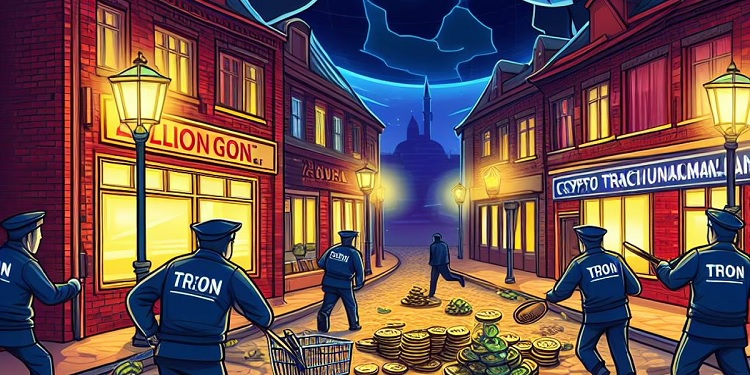A recent report by blockchain analytics firm TRM Labs highlights a decline in illicit cryptocurrency transactions worldwide, juxtaposed with a notable rise in preference for the Tron blockchain, spearheaded by Chinese entrepreneur Justin Sun. The report, published on Wednesday, unveils that in 2023, the Tron blockchain accommodated 45 percent of illicit cryptocurrency transactions, marking a surge from 41 percent in the preceding year.
Tron Emerges as Haven for Illicit Activities
The report underscores a significant uptick in the adoption of Tron for illicit activities such as drug trafficking and terrorist financing. Notably, the number of blockchain addresses associated with terrorist financing on Tron, particularly those receiving the stablecoin Tether (USDT), surged by 125 percent in 2023. TRM Labs identifies Tether as the most utilized stablecoin in criminal undertakings.
Shift in Transaction Trends
While Bitcoin remains a dominant choice for drug-related transactions, the volume of transactions employing the Tron blockchain witnessed a substantial surge, quadrupling from the previous year. Additionally, TRX, the native token of Tron, experienced remarkable growth, with transaction volume escalating nearly tenfold, especially in the realm of online fentanyl sales.
Factors Driving Tron’s Popularity
Angela Ang, Senior Policy Adviser at TRM Labs, suggests that Tron’s allure to illicit actors could be attributed to its minimal transaction fees and rapid transaction speeds, facilitating expedient fund laundering. Furthermore, the prevalence of stablecoins like USDT on the Tron network serves as another catalyst, particularly favored by entities involved in terrorist financing.
Silence from Tron and Tether
Despite the revelations, neither Tron nor Tether provided immediate comments regarding the report’s findings, signaling a reticence on their part to engage with the discourse surrounding illicit activities on their respective platforms.
Controversies Surrounding Tron
Tron, founded by Justin Sun in 2017, has increasingly found itself embroiled in controversies, compounded by regulatory scrutiny. The US Securities and Exchange Commission (SEC) levied charges against Sun and Tron Foundation for purportedly engaging in the unregistered sale of crypto asset securities and manipulative practices in TRX’s secondary market.
Shift in Support for Tron
Circle, the operator of USDC, the world’s second-largest stablecoin, recently announced its decision to discontinue support for the Tron blockchain, citing risk management considerations, further signaling a shift in sentiment towards Tron within the cryptocurrency ecosystem.
Global Trends in Illicit Crypto Transactions
Despite the surge in Tron’s prominence, TRM Labs notes an overall decline of 9 percent in total illicit funds within the crypto ecosystem in 2023, accompanied by a one-third reduction in total transaction volume. This decline is attributed to heightened enforcement actions by governments and an increased number of sanctions imposed on crypto-related entities and individuals by the US government.
In summary, while the global landscape of illicit cryptocurrency transactions witnesses a contraction, the ascent of the Tron blockchain underscores evolving dynamics within the cryptosphere, prompting intensified scrutiny and regulatory responses to address emerging challenges.
This news is republished from another source. You can check the original article here

